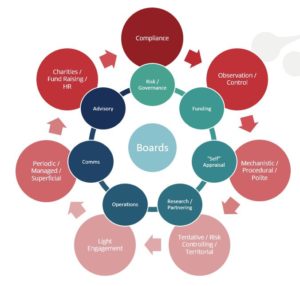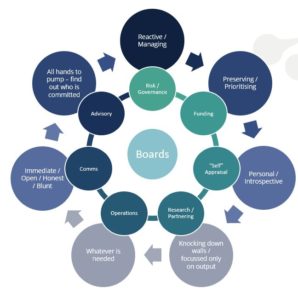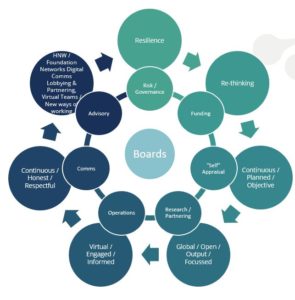Medical research charity Boards need to adapt to the new world or risk failure – Volume 2
By Nick StephensIn volume 1 of this blog, I looked at the tension caused by the growing demands on medical research charities and their heightened financial vulnerability arising from the pandemic. I concluded that charity boards have the opportunity to construct a brighter future for themselves if they use this moment wisely. How might they do this?
Attitudes have changed, minds have been opened
This crisis has brought together all stakeholders in the health ecosystem, from research charities, regulators, governments, health professionals, academics, the life sciences industry and private citizens with one single objective – to beat the virus, not just here, but everywhere. Amazingly, things that seemed impossible have happened easily – academics, clinicians, companies and regulators who once might have refused to join forces are collaborating, letting go their need for recognition, confidentiality or competitive edge, they are now simply working together for the benefit of patients, present and future. New ideas such as the COVID virtual hospital developed by Doctors Andy Barlow and Matthew Knight at West Herts Hospitals could not have happened before this crisis – and now can be applied in dozens if not hundreds of clinical situations. Corporations, healthcare systems and patients are prepared to see things differently. Even my almost-80-year-old father is now a devotee of Zoom GP meetings, when previously anything less than a letter would have been unacceptable.
Outcomes beats ownership
People used to be able to say ‘no’ to change, to ‘veto’ simply because, in truth, they didn’t like it, often using the presumptive ‘I know what’s best for my patients’ objection. That’s simply not tolerated anymore. In fact, mindsets have shifted so much that, pleasingly, the very same people who rejected change no longer tolerate stagnation. The focus has changed from ownership – who should be credited – to outcomes for patients and if we can maintain that focus, we will move towards a better future.
Boards can learn and adapt in the same way
If we look at how boards work and how they might change over time we must recognise that boards have several roles.
 |
BEFORE COVID-19
|
During the crisis this changed very fast, everything went from control to reaction to management and then to active participation of boards.
 |
DURING THE PANDEMIC
|
Many of these changes in attitude and action are very positive and can carry value in the years to come. We recognise now that black swans exist, we have just encountered one, and its effects are going to be long-lasting. So we need to make the most of what we have learnt. The pandemic has highlighted where we are lacking; in our understanding of our own company and others, in our networks, in digital communications, lobbying and partnering. New ways of working and virtual teams are the new norm; we need to shift away from classical ways of running organisations and follow the lead of those at the ”bow wave” of HR practice today. So how might boards function moving forward?
 |
THE FUTURE
|
Evolve to survive
Boards must become more engaged; they must become more engaging and they must become more diverse. By diversity, I mean the kind that ensures survival, because evolution is not about survival of the fittest, it’s about survival of those most suited to their environment. The landscape has changed irreversibly, so charities (and all organisations) need to evolve their boards today to face the future.
The crisis has taught us that resilience is key, and resilience lies in diversity. A monoculture can be efficient but when it is attacked by a pest nothing survives, so diversity of thinking, origin and approach is what we need to bring to our boards.
Conclusion
Right now, CEOs and Chairs have an opportunity to take a breath, lift their heads and look dispassionately at what has happened and what is likely to happen over the next two to five years. We should initiate open and honest conversations, looking at; what contributions board members have made, how they want to contribute moving forward, what they are capable of achieving in the future and how that aligns with organisational goals.
Many CEOs are having conversations with me about their thoughts on this and I am more than happy to have one with you too if you would like to explore possibilities.
Feel free to contact me by phone on +44 (0) 20 3818 8841 or on email at Nick.Stephens@theRSAgroup.com
Nick Stephens, Executive Chairman